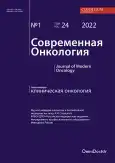Own Experience of Using Lenvatinib in Patients with Advanced Hepatocellular Carcinoma in Real Clinical Practice based on Moscow City Oncological Hospital №62
- Authors: Volkonsky M.V.1, Zhikhorev R.S.1, Makarkina T.A.1, Filippova V.M.1, Vasileva Y.V.1, Akopyan A.A.1, Zhelezkova T.A.1
-
Affiliations:
- Moscow City Oncological Hospital №62
- Issue: Vol 24, No 1 (2022)
- Pages: 106-109
- Section: CLINICAL ONCOLOGY
- URL: https://journals.rcsi.science/1815-1434/article/view/106942
- DOI: https://doi.org/10.26442/18151434.2022.1.201477
- ID: 106942
Cite item
Abstract
Background. Hepatocellular carcinoma (HCC) (hepatocarcinoma) is the most common (about 85% of cases) malignant liver tumor originating from hepatocytes. According to officially published statistics for the city of Moscow for 2019,329 people were registered with the first-ever diagnosed C22 malignant neoplasms (liver and intrahepatic bile ducts, including 6.7% of those who were actively identified. The absolute number of such patients registered at the end of the year was 716, which is 5.7 per 100 000 of the population. The contingent accumulation index is 2.2 (the average for Russia is 1.5). With that,43.1% of patients had stage IV. Mortality rate during the first year after diagnosis is 53.9% (in Russia on the whole, this value is 66.5%). Drug systemic therapy is the method of choice for HCC which is not subject to surgical intervention and local methods of treatment.
Materials and methods. A retrospective analysis of the efficacy and safety of lenvatinib in patients diagnosed with HCC was carried out in real clinical practice at the Outpatient Oncology Care Center of the Moscow City “Oncological Hospital №62”. The data analysis covers the period from February 2016 to June 2021. The analysis included 15 patients with a morphologically verified diagnosis of HCC treated with lenvatinib. For the majority of patients,11 (73.3%) patients received lenvatinib as first-line therapy.
Results. The median progression-free survival was 11.2 months for the entire observation group. In the first line of therapy, the PFS result was the highest and amounted to 12.3 months. The median dose received by patients was 10.9 mg. The level of disease control was 86.6%. The most clinically significant adverse events were grade 2 neutropenia, grade 2 thrombocytopenia, grade 2 asthenia, grade 2–3 hypertension. Lenvatinib had a manageable safety profile.
Conclusion. The performed analysis confirms the data of the REFLECT study on the efficacy of lenvatinib both in healthy patients and in patients with a spectrum of comorbidities with significant (more than 50% of the liver parenchyma) liver damage.
Full Text
##article.viewOnOriginalSite##About the authors
Mikhail V. Volkonsky
Moscow City Oncological Hospital №62
Author for correspondence.
Email: mux19@yandex.ru
ORCID iD: 0000-0003-4060-5015
Cand. Sci. (Med.)
Russian Federation, MoscowRoman S. Zhikhorev
Moscow City Oncological Hospital №62
Email: mux19@yandex.ru
ORCID iD: 0000-0003-2281-7380
oncologist
Russian Federation, MoscowTatiana A. Makarkina
Moscow City Oncological Hospital №62
Email: mux19@yandex.ru
ORCID iD: 0000-0002-1000-4262
chemotherapist
Russian Federation, MoscowViktoriia M. Filippova
Moscow City Oncological Hospital №62
Email: mux19@yandex.ru
ORCID iD: 0000-0003-1990-175X
oncologist
Russian Federation, MoscowYuliya V. Vasileva
Moscow City Oncological Hospital №62
Email: mux19@yandex.ru
ORCID iD: 0000-0001-6394-1578
chemotherapist
Russian Federation, MoscowArshak A. Akopyan
Moscow City Oncological Hospital №62
Email: mux19@yandex.ru
ORCID iD: 0000-0002-0893-9034
chemotherapist
Russian Federation, MoscowTatyana A. Zhelezkova
Moscow City Oncological Hospital №62
Email: mux19@yandex.ru
ORCID iD: 0000-0001-5049-6559
oncologist
Russian Federation, MoscowReferences
- Ассоциация онкологов России; Российское общество клинической онкологии; Российское общество рентгенологов и радиологов. Клинические рекомендации Минздрава России. Рак печени (гепатоцеллюлярный),2020. Режим доступа: https://old.oncology-association.ru/files/clinical-guidelines-2020/rak_pecheni.pdf Ссылка активна на 18.01.2022 [Assotsiatsiia onkologov Rossii; Rossiiskoe obshchestvo klinicheskoi onkologii; Rossiiskoe obshchestvo rentgenologov i radiologov. Klinicheskie rekomendatsii Minzdrava Rossii. Rak pecheni (gepatotselliuliarnyi),2020. Available at: https://old.oncology-association.ru/files/clinical-guidelines-2020/rak_pecheni.pdf Accessed: 18.01.2022].
- European Association for the Study of the Liver. EASL Clinical Practice Guidelines: Management of hepatocellular carcinoma. J Hepatol. 2018;69(1):182-236. doi: 10.1016/j.jhep.2018.03.019
- Злокачественные новообразования в России в 2019 году (заболеваемость и смертность). Под ред. А.Д. Каприна, В.В. Старинского, А.О. Шахзадовой. М.: МНИОИ им. П.А. Герцена − филиал ФГБУ «НМИЦ радиологии» Минздрава России,2020 [Zlokachestvennye novoobrazovaniia v Rossii v 2019 godu (zabolevaemost' i smertnost'). Pod red. AD Kaprina, VV Starinskogo, AO Shakhzadovoi. Moscow: MNIOI im. PA Gertsena − filial FGBU “NMITs radiologii” Minzdrava Rossii,2020].
- Llovet JM, Ricci S, Mazzaferro V, et al. Sorafenib in advanced hepatocellular carcinoma. N Engl J Med. 2008;359(4):378-90. doi: 10.1056/NEJMoa0708857
- Cheng A-L, Kang Y-K, Chen Z, et al. Efficacy and safety of sorafenib in patients in the Asia-Pacific region with advanced hepatocellular carcinoma: a phase III randomised, double-blind, placebo-controlled trial. Lancet Oncol. 2009;10(1):25-34. doi: 10.1016/S1470-2045(08)70285-7
- Bruix J, Raoul J-L, Sherman M, et al. Efficacy and safety of sorafenib in patients with advanced hepatocellular carcinoma: subanalyses of a phase III trial. J Hepatol. 2012;57(4):821-9. doi: 10.1016/j.jhep.2012.06.014
- Kudo M, Finn RS, Qin S, et al. Lenvatinib versus sorafenib in first-line treatment of patients with unresectable hepatocellular carcinoma: a randomised phase 3 non-inferiority trial. Lancet. 2018;391(10126):1163-73. doi: 10.1016/S0140-6736(18)30207-1
Supplementary files







